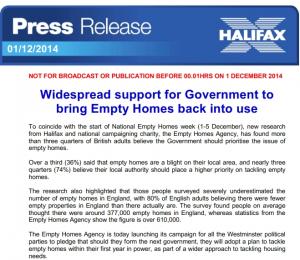



New research from Halifax and the Empty Homes Agency shows how strongly the public feel about empty homes. They want the government and local authorities to do more about them. The survey by ComRes of over 2,000 people across England, Scotland and Wales revealed that
- 78% think the Government should place a higher priority on tackling empty homes
- 74% think their local authorites should do more to tackle empty homes
- 36% think empty homes are a blight in their particular area
- Con. 78%
- Lab. 81%
- LibDem 85%
- UKIP 80%
- 66%: Making use of empty homes to help young people get on the housing ladder.
- 50% Committing in its first year to creating a policy that will focus on bringing long-term empty homes back into use.
- 45% Making it easier for owners of un-used commercial property to turn these spaces into homes.
- 36% Committing to halving the number of long-term empty homes within ten years.
